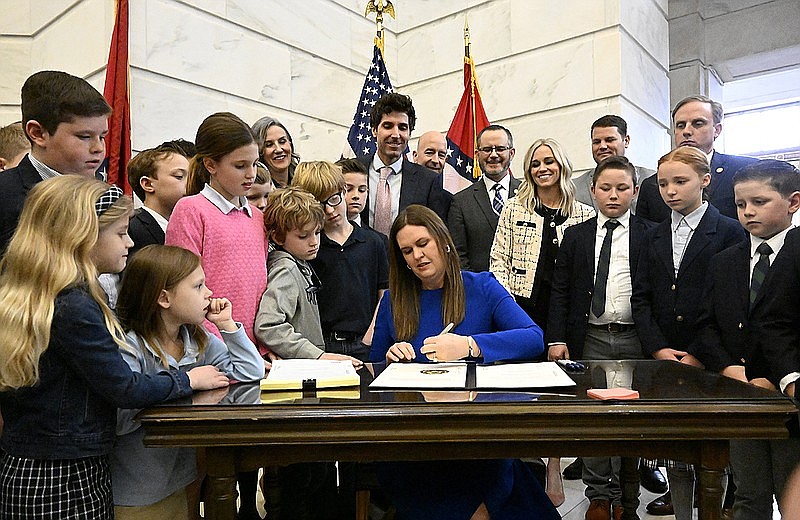Activists have formed a group to repeal Gov. Sarah Huckabee Sanders' signature education legislation, the LEARNS Act.
Citizens for Arkansas Public Education and Students aims to repeal the LEARNS Act through a referendum, giving the final say to Arkansas voters. Steven Grappe, chair of the ballot question committee, said the group formed in the wake of opposition to Sanders' education legislation.
The Arkansas Rural Caucus, which Grappe is the chair of, has held a series of town halls after the passage of the LEARNS Act in early March. Grappe said there is widespread opposition to the law, particularly to its calls for vouchers and concerns about how school districts will be able to afford the newly mandated higher salaries for teachers.
"There [are] a lot of things in the LEARNS act that we do like," Grappe said. "But fiscally the bill is unsafe for Arkansas' rural communities."
The LEARNS act will allow for students to use state funding for education to cover the costs of attending a private or home school. Under a phased-in voucher program, students will receive 90% of the per-pupil funding schools get each year from the state. The per-pupil funding will be $7,618 for the 2023-2024 school year before bumping up to $7,771 for the 2024-2025 school year, according to a separate law legislators also approved this session.
Grappe said some also are opposed to the new volunteer requirement included in the LEARNS Act, which mandates students beginning with the graduation class of 2026-2027 to complete 75 hours of community service by the time they graduate. Grappe said students from rural areas, many of whom work on their family farms, do not have enough free time to complete the mandated 75 hours of community service.
The law also calls for increasing the starting salaries for teachers from $36,000 to $50,000 and $2,000 raises for those already making above the new minimum.
Keith Brooks, a Republican from Little Rock, said the recently passed Revenue Stabilization Act will allocate funding to cover the increase salaries for the LEARNS Act.
"I would hope that folks would give [the] LEARNS [Act] the opportunity to be implemented and work," said Brooks, a co-sponsor of the law. "I hope folks will have the opportunity to see the benefits."
The law easily passed the Republican-controlled state Legislature with a super-majority of lawmakers in both the House and Senate voting for it, and Alexa Henning, a spokesperson for Sanders, said there is support for the LEARNS Act among Arkansans too.
"The governor spoke about LEARNS for two years while campaigning and promised to deliver bold, transformational reforms to our education system and that’s exactly what the people of Arkansas elected her to do," Henning said in a statement to the Democrat-Gazette. "She is happy that LEARNS is now law and that every kid, no matter their zip code, will have access to a quality education and a lifetime of opportunity."
Grappe contends lawmakers’ support for the law is not indicative of how the public feels about the legislation, citing information he collected from Arkansas Rural Caucus panel discussions on the law.
“There just seems to be a giant groundswell of people that were against this,” Grappe said.
Under Article 5, Section 1 of the Arkansas Constitution, citizens have the right to repeal laws passed by the state Legislature through a referendum. To get a referendum on the ballot, a ballot question committee has until 90 days after the Legislature adjourns to collect signatures.
Signatures can only be collected for referendums on laws passed in the most recent session. While lawmakers informally ended the session April 7, the official end of the session, also called "Sine Die," isn't until May 1. To get the referendum on the ballot, Grappe's group would need at least 54,522 signatures, which is 6% of the votes cast in the last gubernatorial election.
Additionally, signatures would have to come from voters in at least 50 different counties, according to a new law passed by the General Assembly during the most recent legislative session. But before volunteers can start gathering signatures, they would need to have the referendum's ballot title and popular name approved by the Arkansas Attorney General's Office. Responsibility for validating the signatures would fall to the Arkansas Secretary of State.
Under a new law, passed by the state Legislature, approval for proposed ballot measures falls back under the jurisdiction of the attorney general, which oversaw petitions prior to 2019. Previously, the state Board of Election Commissioners was tasked with reviewing ballot measures.
The attorney general has 10 business days to review a proposed ballot question and popular name.
